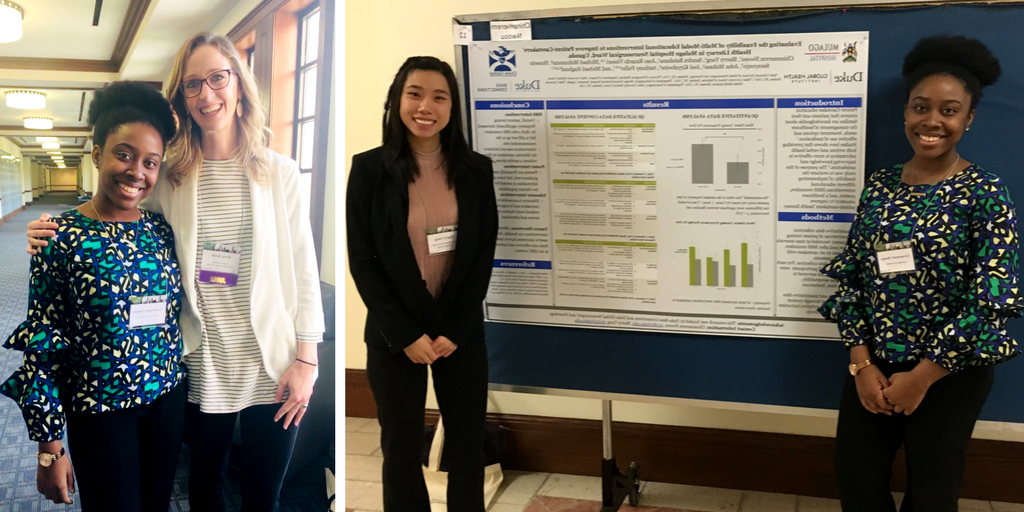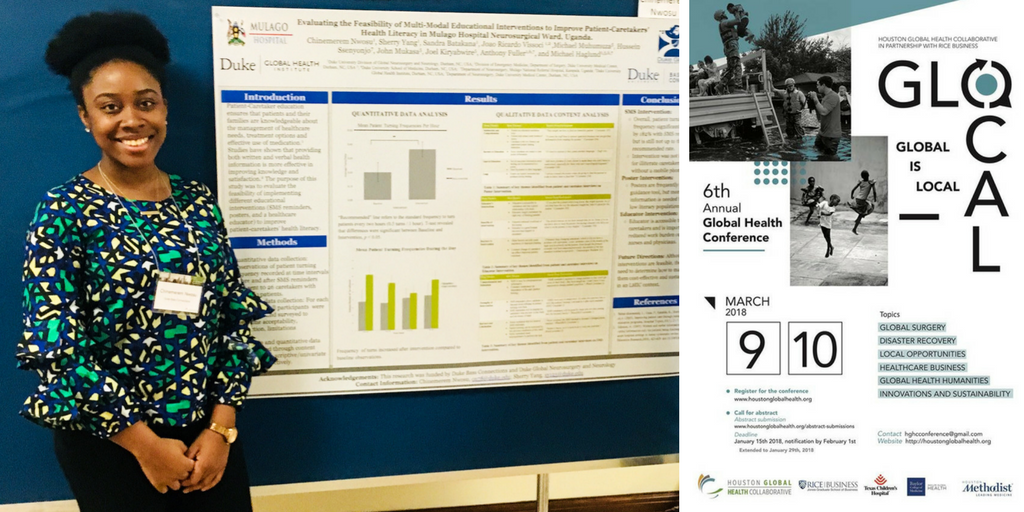Global Is Local: Insights from the GLOCAL 2018 Global Health Conference
April 4, 2018

Two undergraduate members of the Bass Connections Interventions Improving Neurosurgery Patient Outcomes in Uganda team recently traveled to Rice University in Houston to present their research at the GLOCAL 2018 Global Health Conference.
Chinemerem Nwosu ’19 (Program II: Determinants of Health Outcomes in Africa) and Sherry Yang ’19 (Neuroscience) presented their poster “Evaluating the Feasibility of Multi-Modal Educational Interventions to Improve Patient-Caregiver Health Literacy in Mulago Hospital Neurosurgical Ward, Uganda,” and attended talks on the theme of “global is local.”
Nwosu, who recently received a Bass Connections Follow-on Research Award to continue studying family-caregiver health literacy in Uganda, shared this reflection. (Read Yang’s insights here.)
By Chinemerem Nwosu ’19

This March, I had the privilege of presenting research from my Bass Connections project at the Houston Global Health Collaborative’s GLOCAL 2018 Conference. It was inspiring and exciting to be surrounded by professionals from varying fields with a desire to address health challenges around the world. It was also an honor to share my teams’ ongoing research findings and receive useful feedback from professionals in their fields.
The conference’s theme encouraged me to think critically about my role as a researcher in global health – on how I can utilize my research findings to effect change, both abroad and within my immediate community. I learned that “Global is local and local is global” because health and disease have international and national dimensions and health inequities exist in communities across the world from big cities like Lagos and Shanghai to rural towns in North Carolina. As the world population continues to grow and as interactions between people continues to increase, there is a stronger need to develop health solutions that will confront regional and transnational aspects of health challenges and improve health outcomes.
I enjoyed attending the Global Surgery symposium at the conference, which gave me insights relevant to our project in Uganda. As our team continues to work to evaluate and develop interventions to improve the health outcomes of neurosurgery patients, I recognize that it is important to use my research findings to design cost-effective and culturally appropriate methods to address the gaps and barriers to better patient outcomes. More importantly, research should be utilized as a powerful tool to address structural determinants of health, which are responsible for most health disparities, and effect change at the policy level.
The symposium also highlighted the great need to invest in scaling up interventions and building surgical capacity in low- and middle-income countries rather than focusing on short-term “quick fixes” to global health issues. This made me admire even more the phenomenal works of Duke Global Neurosurgery and Neuroscience (DGNN), which has established a robust collaboration with Mulago National Referral Hospital and Makerere University College of Health Sciences in Uganda to train neurosurgeons and strengthen the health system in a sustainable way.
I returned from GLOCAL 2018 inspired by the amazing efforts of like-minded people. Now, I am even more excited about my future research projects with Bass Connections and DGNN that use interdisciplinary approaches to tackle the health issues I am passionate about.
Learn More
- Join us at the Bass Connections Showcase on April 18.
- Check out Bass Connections in Brain & Society teams at the Duke Institute for Brain Sciences (DIBS) Discovery Day on April 15.
- Browse stories from students on their Bass Connections experience.
